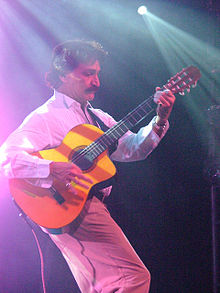Belchior (singer)
Belchior | |
|---|---|
 Belchior performing in 2004 | |
| Background information | |
| Birth name | Antônio Carlos Belchior[1] |
| Born | October 26, 1946 Sobral, Ceará, Brazil |
| Died | April 30, 2017 (aged 70) Santa Cruz do Sul, Rio Grande do Sul, Brazil |
| Genres | |
| Occupation(s) | Singer, songwriter |
| Instruments | Vocals, guitar |
| Years active | 1965–2008 |
Belchior (Portuguese pronunciation: [bewkiˈɔɾ], born Antonio Carlos Belchior,[1] October 26, 1946 – April 30, 2017) was a Brazilian singer and composer.[2] He was one of the first MPB singers from the Brazilian northeast to reach mainstream success, in the early 1970s.
His 1976 album Alucinação [English: Hallucination] is considered by many critics to be the single most influential album in the history of MPB,[3][4] and one of the most important music albums ever published in Brazil.
Biography[]
In 1972 Elis Regina recorded his composition Mucuripe (with Fagner), which was later recorded by Roberto Carlos.[5]
In August 2009, the Fantástico TV show reported that Belchior had not been seen since 2007, after leaving his car parked at the Congonhas Airport, in São Paulo. There were rumors that he had gone into hiding, engaged on the translation of Dante's Divine Comedy into Portuguese, a project on which he had been working for some time. According to the TV news, not even his family had heard from the singer or knew his whereabouts. On August 30, 2009, the same TV show discovered Belchior living with his second wife Edna in a small village in San Gregorio de Polanco, Uruguay. In this interview, he denied having disappeared, declaring he was "resting, composing and thinking about life".[6] In 2012, he disappeared again, alongside his wife, from a 4-star hotel in Artigas, Uruguay, leaving unpaid bills and personal objects behind. For years, not even his family was aware of his whereabouts.[7]
He died of a heart attack on April 30, 2017, at the age of 70.[2]
Discography[]
- 1971 – Na Hora do Almoço (Copacabana – Compacto)
- 1973 – Sorry, Baby (Copacabana – Compacto)
- 1974 – Mote e Glosa (Continental – LP)
- 1976 – Alucinação (Polygram – LP/CD/K7)
- 1977 – Coração Selvagem (Warner – LP/CD/K7)
- 1978 – Todos os Sentidos (Warner – LP/CD/K7)
- 1979 – Era uma Vez um Homem e Seu Tempo (Warner – LP/CD/K7)
- 1980 – Objeto Direto (Warner – LP)
- 1982 – Paraíso (Warner – LP)
- 1984 – Cenas do Próximo Capítulo (Paraíso/Odeon – LP)
- 1986 – Um Show: 10 Anos de Sucesso (Continental – LP)
- 1987 – Melodrama (Polygram – LP/K7)
- 1988 – Elogio da Loucura (Polygram – LP/K7)
- 1990 – Projeto Fanzine (Polygram – LP/K7)
- 1991 – Divina Comédia Humana (MoviePlay – CD)
- 1991 – Acústico (Arlequim Discos – CD)
- 1993 – Baihuno (MoviePlay – CD)
- 1995 – Um Concerto Bárbaro – Acústico Ao vivo (Universal Music – CD)
- 1996 – Vício Elegante (Paraíso/GPA/Velas – CD)
- 1999 – Autorretrato (BMG – CD)
- 1999 – Alucinação
- 2002 – Pessoal do Ceará (Continental / Warner – CD)
- 2008 – Sempre (Som Livre – CD)
References[]
- ^ a b Biografia do trovador. Retrieved May 8, 2017
- ^ a b "Cantor Belchior morre aos 70 anos no Rio Grande do Sul". G1 (in Portuguese). Retrieved April 30, 2017.
- ^ "Alucinação, de Belchior, é o mais revolucionário álbum da história da MPB". Brasil 24/7 (in Portuguese). April 30, 2017. Archived from the original on May 8, 2017. Retrieved May 15, 2018.
- ^ "Belchior: as três grandes canções do disco fundamental". VEJA.com (in Portuguese). Retrieved May 15, 2018.
- ^ Mucuripe
- ^ "O DIA ONLINE – DIVERSĂO & TV – Belchior está no Uruguai com a esposa". September 4, 2009. Archived from the original on September 4, 2009. Retrieved April 30, 2017.CS1 maint: bot: original URL status unknown (link)
- ^ "Belchior: desaparecido por completo há sete anos, cantor faz 70 este ano | Jornal Midiamax". Jornal Midiamax (in Portuguese). October 22, 2016. Retrieved May 15, 2018.
External links[]
- People from Ceará
- 1946 births
- 2017 deaths
- 20th-century Brazilian male singers
- Brazilian composers
- Música Popular Brasileira singers
- Música Popular Brasileira guitarists
- Brazilian composer stubs
- Brazilian musician stubs